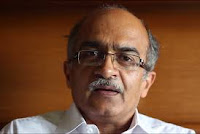The Petitioner,
an NGO called Common Cause, through activist lawyer Prashant Bhushan filed a
petition [IA No. 3 & 4 of 2017 in Writ Petition (Civil) No. 505/2015] in
the Hon’ble Supreme Court of India praying for constitution of a SIT (Special
Investigation Team) for investigation into the incriminating material seized in
the raids conducted by CBI on the Birla and Sahara Group of Companies in
October 2013 and November 2014 respectively. He further prayed that
investigation by Special Investigation Team should not be only ordered, but it
should be monitored by the Supreme Court.
The Petitioner
argued that the allegations which are reflected by the materials collected
indicates commission of cognizable offence. He urged that it is the bounden duty of the
Court to direct investigation and falsity or correctness of the documents has
to be seen in course of the investigation.
On the other
hand, Mr. Mukul Rohtagi, the Attorney General for the Government argued that the
material in question with respect to Sahara Group on the basis of which
investigation is sought for, have been found by the Income Tax Settlement
Commission (ITSC), in proceedings under Section 245D of the Income Tax Act, to
be doubtful; the documents which have
been filed by the Birla as well as Sahara Group are not in the form of account
books maintained in regular course of business; they are random sheets and
loose papers and their correctness and authenticity, even for the purpose of
income mentioned therein have been found to be un-reliable having no
evidentiary value, by the concerned authorities of income tax; The documents of
Birla Group are also the same; they are not in the form of regular books of
account and are random and stray materials and thus the case of Birla also
stands on the same footing.
Placing reliance
on the decision in C.B.I. versus V.C. Shukla 1998 (3) SCC 410, the AG further submitted
that it is open to any unscrupulous person to make any entry any time against
anybody’s name unilaterally on any sheet of paper or computer excel sheet; There
being no further corroborative material with respect to the payment, no case is
made out so as to direct an investigation, and that too against large number of
persons named in the documents; Such entries have been held to be prima facie
not even admissible in V.C. Shukla’s case. He urged that in case investigation
is ordered on the basis of such documents, it would be very dangerous and no
constitutional functionary/officer can function independently, as per the
constitutional imperatives; No case is made out on the basis of material which
is not cognizable in law, to direct investigation.
After discussing
the earlier judgments on the subject, the Bench of Justice Arun Mishra and Justice
Amitava Roy by its Judgment dated 11th January 2017 finally rejected
the application in following words :
“27. Considering
the aforesaid principles which have been laid down, we are of the opinion that
the materials in question are not good enough to constitute offences to direct
the registration of F.I.R. and investigation therein. The materials should
qualify the test as per the aforesaid decision. The complaint should not be
improbable and must show sufficient ground and commission of offence on the
basis of which registration of a case can be ordered. The materials in question
are not only irrelevant but are also legally inadmissible under Section 34 of
the Evidence Act, more so with respect to third parties and considering the
explanation which have been made by the Birla Group and Sahara Group, we are of
the opinion that it would not be legally justified, safe, just and proper to
direct investigation, keeping in view principles laid down in the cases of
Bhajan Lal and V.C. Shukla (supra).
28. In view of the materials which have
been placed on record and the peculiar facts and circumstances projected in the
case, we find that no case is made out to direct the investigation as prayed
for”.





